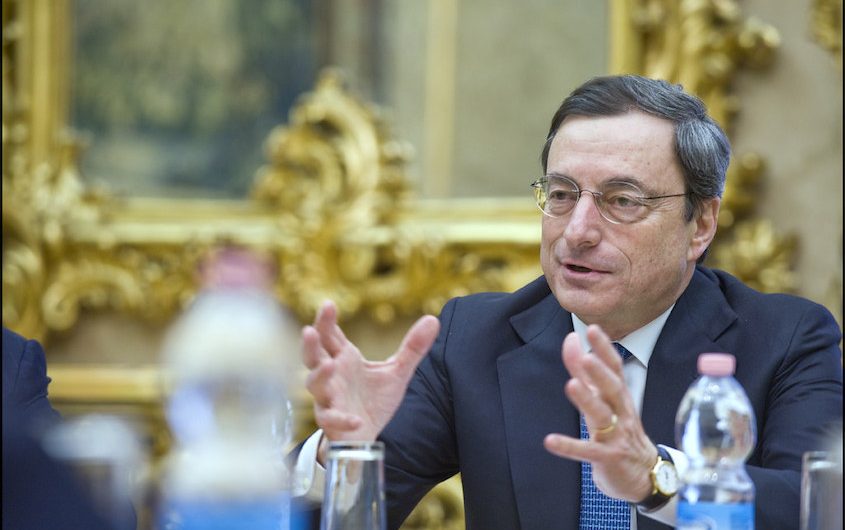
European Parliament via Flickr
Draghi to the Rescue, Act Two

Alexander Privitera
AGI Non-Resident Senior Fellow
Alexander Privitera a Geoeconomics Non-Resident Senior Fellow at AGI. He is a columnist at BRINK news and professor at Marconi University. He was previously Senior Policy Advisor at the European Banking Federation and was the head of European affairs at Commerzbank AG. He focuses primarily on Germany’s European policies and their impact on relations between the United States and Europe. Previously, Mr. Privitera was the Washington-based correspondent for the leading German news channel, N24. As a journalist, over the past two decades he has been posted to Berlin, Bonn, Brussels, and Rome. Mr. Privitera was born in Rome, Italy, and holds a degree in Political Science (International Relations and Economics) from La Sapienza University in Rome.
Italian prime minister Mario Draghi describes his own country as “beautiful, but fragile.” The former central banker is trying to replicate in Italy what he did for the monetary union during his tenure as president of the European Central Bank: make it more resilient.
The goal is ambitious: if Italy can be put back on track, Europe will have to agree to integrate further. Officially, common EU recovery funds agreed in response to the Covid pandemic are one-off measures. In reality, they could become permanent features of a vastly expanded toolbox. Whether the common EU fiscal response to the pandemic is the Hamiltonian moment that many analysts spoke of when EU leaders agreed to mutualize 750 billion euros, now largely depends on how Italy does in the next few years. The bulk of common European funds, about 200 billion euros, will be dedicated to tackling Italy’s chronic lack of competitiveness. The mix of grants and loans will be largely dedicated to digitalize the Italian economy and public administration and accelerate the green transition. Draghi’s plans also foresee an ambitious overhaul of the justice system whose slowness is considered an impediment to foreign direct investments.
Europe is watching the former central banker with hope and anxiety. If Italy fails to reform, Europe will likely be stuck in a bad equilibrium for many years: too big to disintegrate, but also too cumbersome to be able to respond to the economic and geopolitical challenges it currently faces with the necessary pragmatic agility and ambition. Draghi’s plan is not only to save Italy, but also to build on the work that he began at the helm of the ECB, to push Europe and in particular the Eurozone to integrate further.
The big question now is, can the country deliver? If it does not, European governments will be tempted to revert to mutual finger pointing, a behavior that was kept in check even during the worst months of the Covid pandemic.
If belt tightening became German government policy, it could quickly put a new conservative government in Berlin on a collision course with Draghi and his closest European allies, such as France.
Much will also depend on which way Germany will go once Chancellor Angela Merkel leaves office in autumn. German conservatives in her CDU party are split on the path forward for Europe. Many are weary of big public spending plans, European and national alike, that emerged during the pandemic. The temptation to return to belt tightening measures is very present. If that became government policy, it could quickly put a new conservative German government on a collision course with Draghi and his closest European allies, such as France. It would be a repeat of the North-South split experienced during the so-called euro crisis.
There are already signs that parts of the German conservative camp are getting nervous about the very high levels of public debt in parts of the euro area and are ready for a repeat of the heated debate on fiscal consolidation that gripped Europe during the so-called debt crisis in the past decade. In a recent op-ed published in an Italian paper, Wolfgang Schaeuble, the former German finance minister and now respected president of the Bundestag, reminded Italians and Draghi of their “homework” and flat out proposed to put the country under partial external control in order to manage and reduce its excessive debt. While Germany used the ample fiscal space that it gained thanks to years of belt tightening and strong growth, the public debt ratio in Italy will indeed rise to more than 160 percent of GDP. Draghi and Schaeuble rarely agreed during the euro crisis. The German still represents the conservative soul of the CDU that is wary of a “Mediterranean” monetary union, one in which fiscal dominance becomes an impediment for the ECB to pursue its mandate of price stability.
In the past, Merkel was able to smoothen the rougher edges of the pro-austerity camp in her own government and take a more pragmatic approach. It is unclear which way her party will go once she leaves office.
In the past, Merkel was able to smoothen the rougher edges of the pro-austerity camp in her own government and take a more pragmatic approach. It is unclear which way her party will go once she leaves office. However, predicting a collision course with Italy and other Southern Eurozone member states is not a foregone conclusion, for many reasons. Debt—a combination of public and private exposure—is growing everywhere, even in countries that are not considered profligate. For debt management purposes it is almost irrelevant whether a country has a higher public or private debt burden. Both need to be refinanced. If monetary policies were to be tightened prematurely, most EU economies, such as the Netherlands for example, would therefore face challenges. Given widespread calls for a soft landing of the EU economy, it is in fact hard to imagine that the ECB would repeat the mistakes made in 2011 when it tightened monetary policies at the first signs of inflation and allowed the Eurozone to plunge into recession.
Furthermore, even in Germany the political discourse is changing. In polls, a majority of voters currently back parties that are more open-minded towards targeted debt spending and a more active role of governments in market economies. The Green Party, which is currently ahead in the polls, would like to accelerate the transition to a green economy. That simply won’t happen without public support. Any coalition government that includes the Greens would tame extreme forms of belt tightening instincts and an overreliance on the wisdom of markets. Indeed, Draghi’s and Macron’s vocal push to protect European assets from foreign takeovers (primarily Chinese), for example, enjoys wide political support in Germany too. Europe as a whole is becoming more assertive in its industrial policies thanks to an alignment of German, French, and Italian positions. Partly as a consequence of the pandemic, Europe is more open to reconsider some of its competition policies, as it now sees itself as having been a bit too naïve in dealing with non-European state-sponsored investors.
Draghi and almost any possible German government emerging from the elections in September will try to strengthen transatlantic ties. The current U.S. administration is widely considered a chance to reset the relationship. There is a realistic chance to advance Draghi’s (and French president Macron’s) more ambitious idea of Europe, with the end goal of some sort of permanent EU fiscal capacity funded by “own resources”(revenues generated independently). It would, however, be premature to expect far-reaching decisions to occur in the near future. Draghi will wait for the German political dust to settle before pushing any grand European designs. Macron himself is facing an uncertain political future.
Further concrete progress could be expected soon on some legacy projects that Draghi contributed to launching as a central banker, such as the banking union. There, too, Germany’s position has softened. The debate on reforming common European fiscal rules will also likely gain some traction. Fiscal rules are currently suspended because of Covid. It is unclear whether they can be reintroduced without any changes in 2023.
But for now, Draghi’s main objective is to make sure that Italy starts spending European public funds well. That would give him the additional political capital needed to start phase two and push for a more ambitious European agenda. However, it is not clear whether the Italian political establishment, currently supporting the government, is fully conscious of the chance and responsibility it has. The clear and present temptation for professional politicians in Rome will always be to use Draghi for as long as needed, and then find a convenient excuse to withdraw parliamentary support and replace him. That would be the moment when Germany starts hardening its own positions vis-à-vis Europe. The favorable time window for taking significant steps towards a stronger and more integrated European Union would have been wasted.








